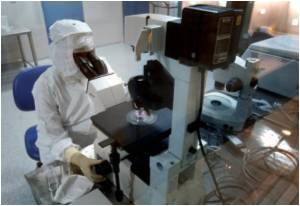
"This is yet another advance in the era of 'individualizing' a patient's care," said Dr. Lazarus. "These significant findings will provide an important new tool to predict patients' response to cancer-fighting therapies and will help physicians avoid over-treating some patients and under-treating others."
The new study performed an analysis of mutations in 18 genes in 398 patients younger than 60 years of age with AML who were randomly assigned to receive therapy with high-dose or standard dose daunorubicin. Researchers validated their prognostic findings in an independent set of 104 patients.
The researchers found that mutations in two genes (DNMT3A and NPM1) and translocations (movement of part of one gene to another gene, the MLL gene) were associated with improved patient outcomes with the higher doses of daunorubicin chemotherapy in AML patients.
"Information of this type could be used by a clinician for treatment planning at diagnosis and the start of therapy," said Dr. Lazarus. "That is, if the patient has the mutation in question, the clinician can go ahead and give the higher chemotherapy dose. If the patient does not have the mutation, a higher dose may not be of benefit."
The multi-site study is an analysis of genetic factors from patients who participated in a landmark 2009 study which changed the routine treatment practice for AML. That study, also published in the New England Journal of Medicine, demonstrated for the first time that a more intense initial regimen using higher doses of daunorubicin significantly improved remission rate (70.6% vs. 57.3% with a standard dose) and improved overall survival (median, 23.7 vs. 15.7 months). More patients achieved remission with only one cycle of therapy, rather than two cycles, more patients proceeded to transplant, and overall outcome was significantly improved.
Advertisement
Source-Eurekalert










